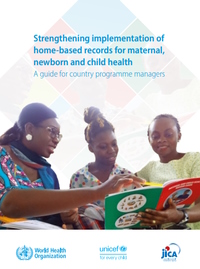Strengthening implementation of home-based records for maternal, newborn and child health: A guide for country programme managers
Home-based records have a long history, initially used to record proof of smallpox vaccinations in the mid-1800s. Today, more than 163 countries use a form of home-based record, such as antenatal notes, vaccination-only cards, child health booklets or integrated maternal and child health handbooks. These documents are used to record an individual’s history of health services received and can also provide basic health promotion messages. The WHO recommends home-based records to improve care-seeking behaviours, men’s involvement and support in the household, maternal and child home care practices, infant and child feeding and communication between health workers and women, parents and caregivers. Despite the wide use of home-based records, implementation challenges persist, such as stockouts, incorrect use of home-based records by health workers or low retention by women, parents and caregivers.To support countries to address these, WHO, UNICEF and JICA have developed this implementation guide targeted to programme managers within ministries of health, as well as key implementation partners involved in making decisions and taking actions to strengthen the implementation and use of home-based records for improved maternal, newborn and child health (MNCH) outcomes. The guide includes activities and decision-making tools, as well as many examples from countries and links to existing resources that can be used to strengthen planning, design, implementation and monitoring processes with the goal to maximize the benefits of home-based records for women, parents, caregivers, health workers and programme managers.
Related links:
• International conference on early childhood development in Pakistan
Organization: World Health Organization, UNICEF, Japan International Cooperation Agency (JICA)
Year: 2022
Language: English
Web link: https://www.who.int/publications/i/item/9789240060586





